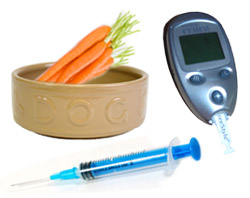Dog Diabetes Causes & Symptoms
Diabetes mellitus (often called sugar diabetes) is a common disease in dogs. It is estimated that approximately 1 in 500 dogs develops diabetes.
Diabetes in dogs has a mixture of inherited and environmental causes. All breeds of dog can be affected but certain breeds seem to show a higher incidence of diabetes than others, indicating an inherited factor in some cases. Environmental factors include old age and obesity. The disease is also more prevalent in bitches, especially unspayed bitches.

Causes of diabetes
When the body is working normally, ingested sugars are stored in the liver for later use when blood glucose levels drop. This keeps glucose levels in the body stable until the next meal. The hormone required for this process is insulin, produced by the pancreas. The most common cause of diabetes is lack of insulin production or lack of response to insulin, often because the pancreas itself or the liver is damaged or diseased.
As in humans, obesity in dogs is becoming a major issue in today's world of poor diets and lack of exercise. The rise in obese dogs has led to a rise in the number of dogs suffering from diabetes.
It is important to keep your dog's weight within the ideal range and do a body check to make sure they are a healthy weight. See Dog Weight and Dog Obesity for more advice on this issue.
Effects of diabetes
With no proper storage or slow release of glucose, a dog suffering with diabetes suffers from high levels of glucose in their system after a meal and low levels between meals.
If the levels become high enough they can cause fits and long term diabetes sufferers, if left unchecked, can suffer sugar deposited in the eyes which can lead to blindness. Severe untreated diabetes can result in death. Hypoglycemia can occur when blood sugar levels become too low. If your dog develops this serious condition you can rub a sugary solution onto their gums. Keep a pot of honey with you for emergencies and contact your vet immediately.
Signs and symptoms of diabetes
Increased thirst and urination, weight loss despite eating normally, increased appetite (later leading to loss of appetite as the disease progresses), vomiting, collapse and loss of consciousness. Diabetic dogs are also prone to urinary infections and diabetic cataracts.
Diagnosing diabetes
Glucose levels can be checked with a simple blood test. To do a proper diagnosis a number of blood tests are often carried out throughout the day to track glucose levels. Urine tests can also be performed, indicating whether sugar is present in the dog’s urine.

Controlling diabetes in dogs
There is no cure for diabetes but it can be managed. In humans, diabetes mellitus can often be controlled with careful diet and oral medications. Unfortunately this is not the case for dogs as the oral drugs for diabetes mellitus are not effective for dogs. A dog with diabetes will require daily or twice daily insulin injections. When injecting, owners should vary the injection site daily.
Also advised is to feed a low sugar diet that is high in complex carbohydrates and fibre. These are broken down slowly by the body, causing less dangerous peaks and troughs in blood glucose levels. Feeding 2-3 smaller meals a day is much better for blood sugar levels than one larger meal once a day, so divide the dog's food into smaller portions.
Some trial and error is involved to begin with as you and your vet work towards the best management plan. Quite a high level of ongoing commitment is needed from the dog's owner. Once a successful treatment plan is established, many diabetic dogs can lead close to normal lives. However some dogs have difficulty stabilising and can have complications.
Suitable medications and diet, close monitoring, regular check ups and urine testing, fixed regular injection and feeding routines, consistent calorie intake and activity levels and sheer dedication are the key to success with diabetes in dogs.
By Jenny Prevel
© D for Dog www.dfordog.co.uk
This article belongs strictly to D for Dog and we do not authorise the copying of all or any part of it.
